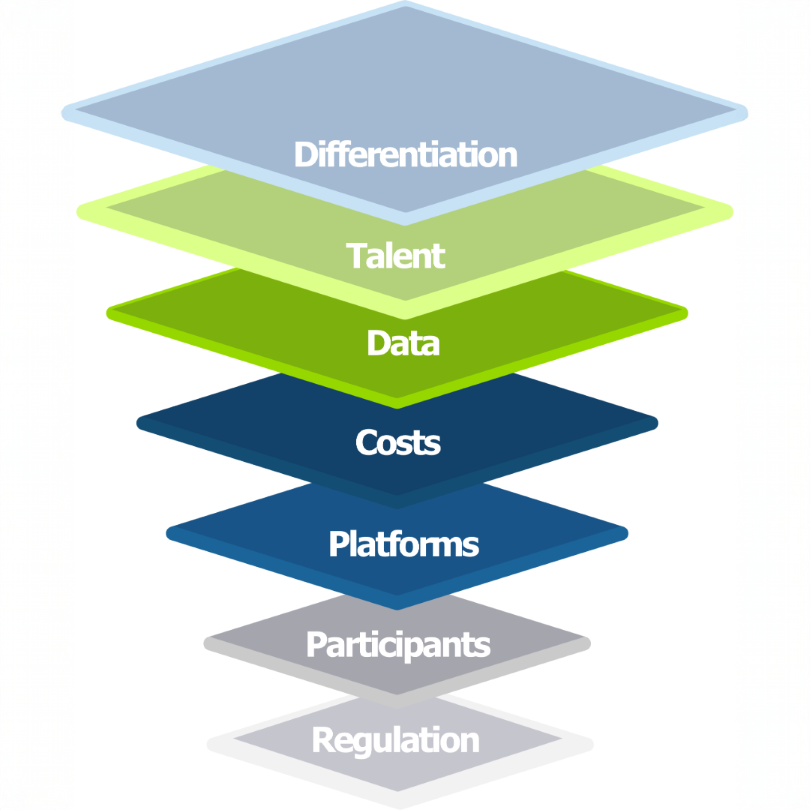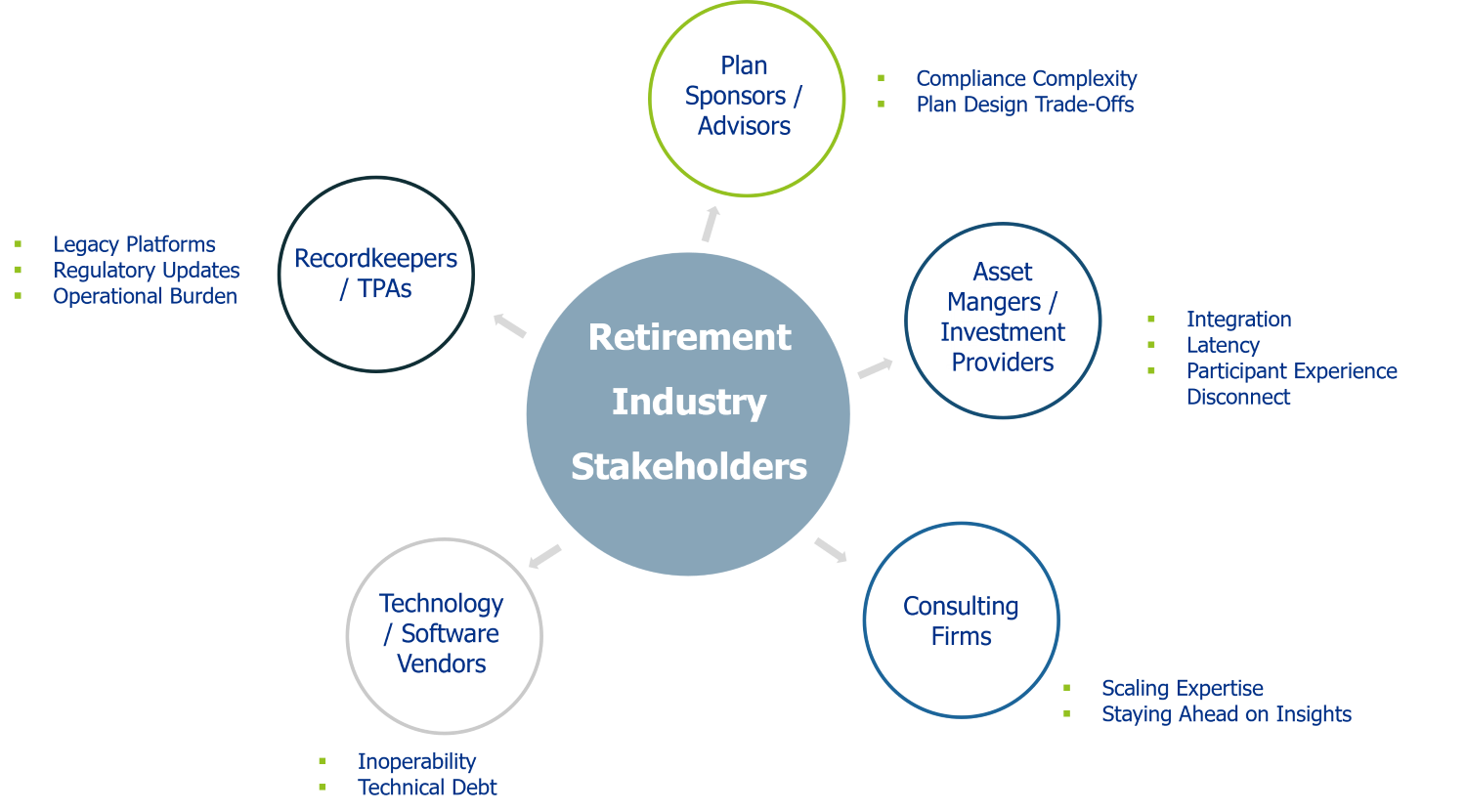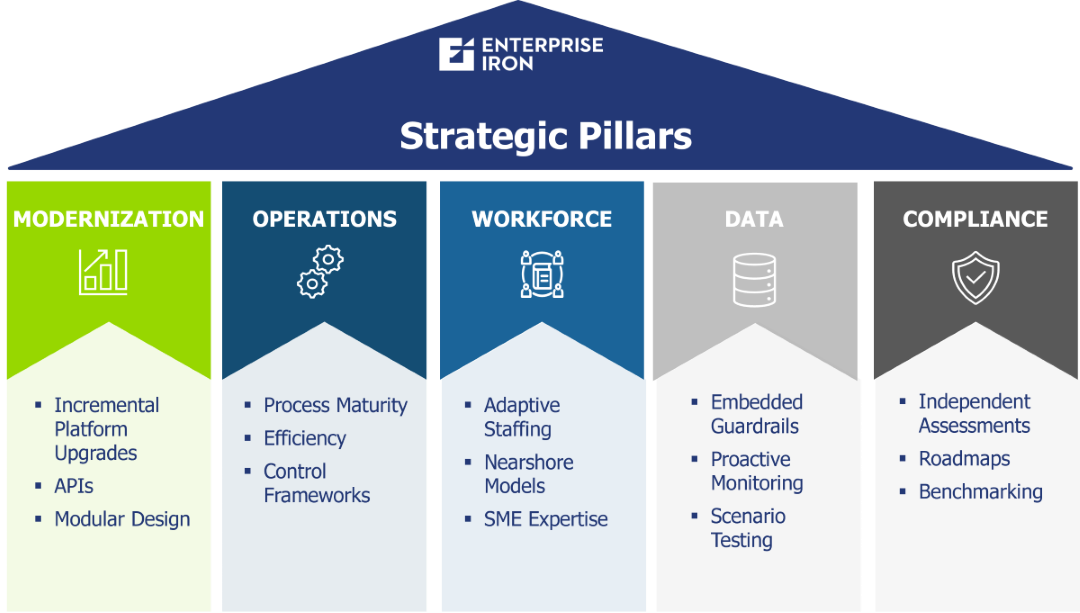Executive Summary
The retirement industry is at a turning point. Whether you are a Recordkeeper, Advisor, Asset Manager, or Technology Partner, chances are your organization is feeling the weight of rapid change. Regulations are evolving faster than ever, participants want personalized and transparent experiences, and it is increasingly difficult to stand out in a crowded marketplace. At the same time, many firms are managing shrinking margins, fragmented data, aging systems, and a shortage of specialized talent.
At Enterprise Iron, we have spent more than 20 years working alongside firms across every corner of the retirement landscape. We have seen both the challenges and the opportunities that come with transformation. This whitepaper reflects those experiences, the recurring obstacles, the risks that can derail progress, and the practical steps that have helped organizations move forward with confidence.
WHITEPAPER
October 16, 2025

The Current Retirement Imperative
The retirement industry today is being reshaped by forces no organization can ignore. New rules like SECURE Act 2.0 have added layers of compliance and fiduciary oversight. Participants now expect seamless mobile access and digital self-service, benchmarking their retirement platforms against the convenience of consumer apps.
Legacy systems are another pain point. Many providers are caught between the risks of large-scale “rip and replace” migrations and the ongoing strain of maintaining outdated technology. Cost pressure continues to erode margins, prompting outsourcing, vendor partnerships, and relentless efficiency drives. Data silos further complicate operations, as reconciliation across multiple systems consumes valuable time and resources. And across the industry, firms are competing for scarce talent in compliance, operations, and technology.
Ultimately, organizations must do more with less:
- Remain compliant,
- Create participant value, and
- Stand apart in a market threatened by commoditization.

Challenges Across Stakeholders
The pressures facing the industry show up differently depending on where you sit. Recordkeepers and TPAs grapple with legacy platforms, heavy operational burdens, and constant regulatory updates. Advisors and Plan Sponsors must make sense of complex plan design trade-offs while keeping pace with changing laws. Asset managers often struggle to integrate their products into Recordkeeping systems in ways that create a consistent participant experience. Technology vendors deal with interoperability challenges and technical debt that make integrations fragile. Even consulting firms like ours must continually sharpen expertise and scale teams to meet demand.
The consequences are real:
- Compliance missteps,
- Audit risks,
- Stalled implementations,
- Frustrated clients, and
- Reputational harm.
What all stakeholders need, however, is remarkably consistent, better integration, operational maturity, flexible staffing models, and access to trusted, independent advice.

Insights from the Field
Over the years, we have noticed recurring patterns across client projects. Adding new modules into legacy ecosystems often turns data reconciliation into a full-time burden. Plan sponsors sometimes underestimate how seemingly minor compliance changes can snowball into costly remediation. Even firms considered “modern” often carry more technical debt than they realize.
We also see that staffing flexibility is a game changer. Few organizations have the bandwidth or the specialized expertise to handle peak cycles or complex transformations on their own. Time and again, clients tell us they value having an outside perspective, someone who can cut through internal politics and focus on what really matters.
Strategic Pathways Forward
Adapting to today’s environment does not mean taking on massive, high-risk transformations. In fact, some of the most effective strategies are incremental and pragmatic.
- Modernize platforms gradually. Rather than replacing entire systems, refactor or modularize to reduce risk while enabling future innovation.
- Elevate operational excellence. Regular health checks, standardized processes, and performance frameworks provide stability and scalability.
- Adopt adaptive workforce models. Flexible staffing, nearshore resources, and SME expertise help manage peaks without overextending core teams.
- Strengthen data foundations. Unified architecture and strong governance reduce reconciliation headaches and enable real-time insight.

Risks and Roadblocks
Even the best strategies can stumble without careful execution. Cultural resistance, underestimated technical debt, and poor governance frequently slows progress. Scope creep, talent mismatches, and weak testing or migration practices can derail initiatives altogether. These risks underscore the importance of phased delivery, clear accountability, and strong oversight across stakeholders.
What Success Looks Like
Firms that thrive in today’s environment tend to share some common traits:
- They modernize in manageable steps.
- They embed compliance and governance into everyday operations.
- They treat data as a strategic asset, not an afterthought.
- They adapt workforce models to balance flexibility with expertise.
- Most importantly, they earn trust by delivering consistent, participant-focused value and objective guidance.
Conclusion
The retirement industry faces unprecedented complexity, but with that comes opportunity. Organizations that embrace pragmatic modernization, operational discipline, adaptive staffing, and compliance-by-design will be best positioned to compete and grow. By aligning strategy with execution, firms can transform disruption into resilience.
About Enterprise Iron
Enterprise Iron is a consulting firm with more than 20 years of deep expertise in Retirement Operations, Compliance, and Technology Transformation. Our team of seasoned subject matter experts has guided some of the largest Recordkeepers and industry firms through modernization, integration, and regulatory change. We focus on delivering independent, practical guidance tailored to each client’s unique challenges.
Explore case studies highlighting our real-world experience at enterpriseiron.com/case-studies. Learn how our expertise can help strengthen your organization. Get in touch with us at info@enterpriseiron.com or connect with us on LinkedIn to start the conversation.
